会计英语 面试问题准备
- 格式:pdf
- 大小:151.42 KB
- 文档页数:6
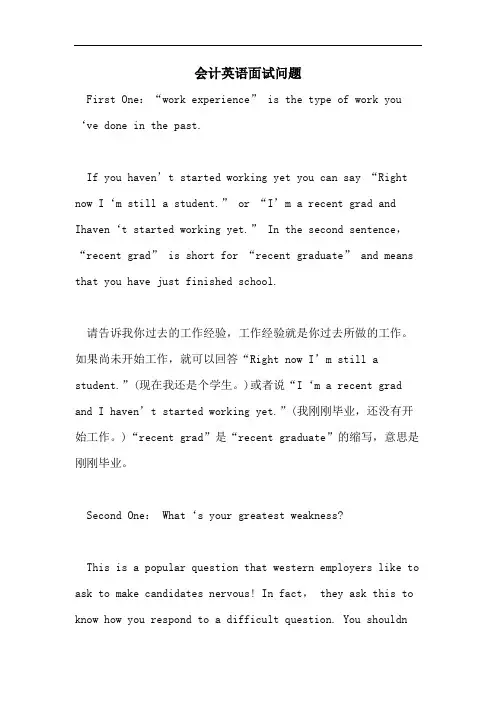
会计英语面试问题First One:“work experience” is the type of work you‘ve done in the past.If you haven’t started working yet you can say “Right now I‘m still a student.” or “I’m a recent grad and Ihaven‘t started working yet.” In the second sentence,“recent grad” is short for “recent graduate” and means that you have just finished school.请告诉我你过去的工作经验,工作经验就是你过去所做的工作。
如果尚未开始工作,就可以回答“Right now I’m still a student.”(现在我还是个学生。
)或者说“I‘m a recent grad and I haven’t started working yet.”(我刚刚毕业,还没有开始工作。
)“recent grad”是“recent graduate”的缩写,意思是刚刚毕业。
Second One: What‘s your greatest weakness?This is a popular question that western employers like to ask to make candidates nervous! In fact, they ask this to know how you respond to a difficult question. You shouldn‘t answer by ___ing your greatest weakness since you might not get the job! Instead, you can ___ them something that isn’t directly related to the job position.你最大的.缺点是什么?西方老板特别爱问这个问题,让面试者感到很紧张。
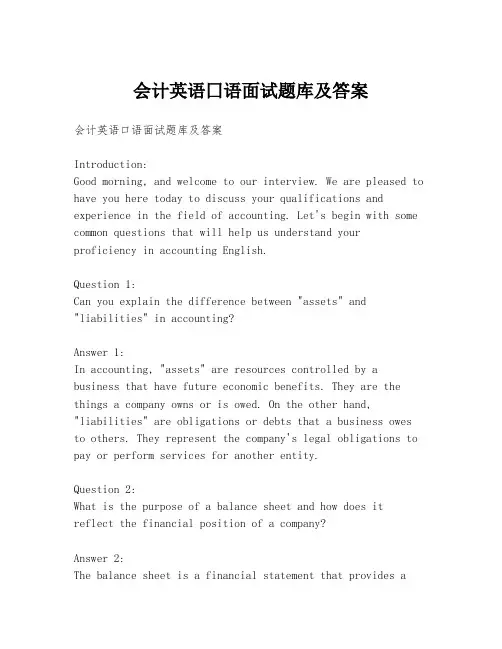
会计英语囗语面试题库及答案会计英语口语面试题库及答案Introduction:Good morning, and welcome to our interview. We are pleased to have you here today to discuss your qualifications and experience in the field of accounting. Let's begin with some common questions that will help us understand yourproficiency in accounting English.Question 1:Can you explain the difference between "assets" and "liabilities" in accounting?Answer 1:In accounting, "assets" are resources controlled by a business that have future economic benefits. They are the things a company owns or is owed. On the other hand, "liabilities" are obligations or debts that a business owes to others. They represent the company's legal obligations to pay or perform services for another entity.Question 2:What is the purpose of a balance sheet and how does itreflect the financial position of a company?Answer 2:The balance sheet is a financial statement that provides asnapshot of a company's financial position at a specific point in time. It reflects the company's assets, liabilities, and equity. The fundamental accounting equation, Assets = Liabilities + Equity, is the basis for the balance sheet and shows how the company is financed and what it owns.Question 3:How would you describe the role of an "audit" in the context of accounting?Answer 3:An audit is an independent examination of a company's financial statements by a qualified auditor. It is conducted to provide an opinion on whether the financial statements are free from material misstatement and are presented fairly, in all material respects, in accordance with the applicable financial reporting framework.Question 4:Can you explain the term "depreciation" and why it is important?Answer 4:Depreciation is the systematic allocation of the cost of a tangible asset over its useful life. It is important because it reflects the wear and tear or consumption of the asset over time, which is essential for matching expenses with revenues and maintaining accurate financial records.Question 5:What do you understand by "cash flow" and why is it crucialfor a business?Answer 5:Cash flow refers to the inflow and outflow of cash and cash equivalents from a business. It is crucial because it indicates the liquidity of a business and its ability to generate enough cash to meet its financial obligations, such as paying debts, investing in operations, and distributing dividends.Question 6:How would you define "revenue recognition" in accounting?Answer 6:Revenue recognition is the process of accounting for revenue when it is earned by a company. It involves recognizing revenue in the accounting records when it is realized or realizable and earned. This is important for accurately reflecting the company's performance and financial health.Question 7:What is the role of "cost accounting" in a business?Answer 7:Cost accounting is the process of identifying, measuring, and recording the various costs incurred in the production of goods or services. It helps businesses understand the costs associated with their operations, make informed decisions about pricing, and control costs for improved profitability.Conclusion:Thank you for your detailed answers. We have a good understanding of your knowledge and skills in accounting English. We will be in touch with you shortly regarding the next steps in the interview process. Have a great day!。
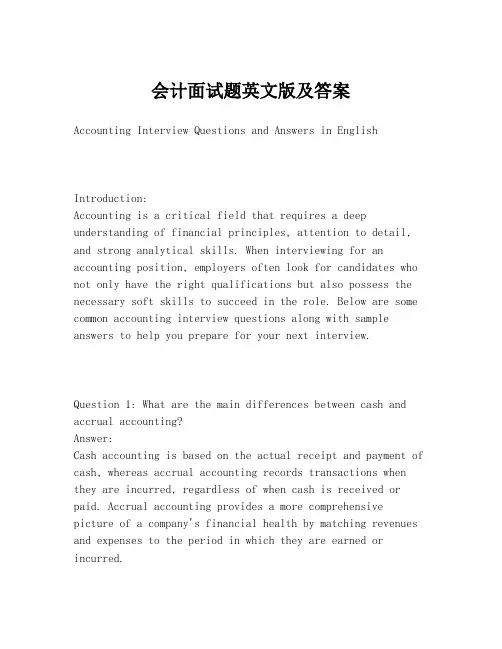
会计面试题英文版及答案Accounting Interview Questions and Answers in EnglishIntroduction:Accounting is a critical field that requires a deep understanding of financial principles, attention to detail, and strong analytical skills. When interviewing for an accounting position, employers often look for candidates who not only have the right qualifications but also possess the necessary soft skills to succeed in the role. Below are some common accounting interview questions along with sample answers to help you prepare for your next interview.Question 1: What are the main differences between cash and accrual accounting?Answer:Cash accounting is based on the actual receipt and payment of cash, whereas accrual accounting records transactions when they are incurred, regardless of when cash is received or paid. Accrual accounting provides a more comprehensivepicture of a company's financial health by matching revenues and expenses to the period in which they are earned or incurred.Question 2: How do you handle complex financial transactions? Answer:I approach complex financial transactions by breaking them down into smaller, manageable parts. I ensure that I understand the nature of the transaction, the parties involved, and the timing. I then apply the relevant accounting principles and standards, and document my process and rationale for future reference and audits.Question 3: What is your experience with financial statement analysis?Answer:I have extensive experience analyzing financial statements to assess a company's performance and financial health. I use various financial ratios and benchmarks to evaluate profitability, liquidity, solvency, and operational efficiency. This analysis helps in making informed decisions and identifying areas for improvement.Question 4: How do you ensure accuracy in your work? Answer:Accuracy is paramount in accounting. I ensure accuracy by double-checking my work, using reliable accounting software, and adhering to established procedures and controls. I also collaborate with my team for peer reviews and leveragetechnology for automated checks and balances.Question 5: Can you explain the importance of internal controls in an organization?Answer:Internal controls are essential for maintaining the integrity of financial reporting, preventing fraud, and ensuring compliance with laws and regulations. They help safeguard assets, promote operational efficiency, and provide a basis for reliable financial reporting.Question 6: How do you stay updated with the latest accounting standards and regulations?Answer:I stay updated by regularly attending professional seminars, participating in webinars, subscribing to industry publications, and engaging in continuous professional development. I also network with peers to exchange knowledge and insights.Question 7: Describe a challenging situation you faced in an accounting role and how you resolved it.Answer:In a previous role, I encountered a discrepancy in the monthly financial statements that required immediateattention. I identified the error, traced it back to its source, and corrected it promptly. I then worked with the team to implement additional checks to prevent similar issues in the future.Question 8: How do you manage your time effectively when dealing with multiple deadlines?Answer:I prioritize tasks based on their urgency and importance, and I create a schedule that allocates time for each task. I also use project management tools to track progress and ensurethat all deadlines are met. Communication with team members and stakeholders is key to managing expectations and ensuring timely completion of tasks.Conclusion:Preparing for an accounting interview involves understanding the technical aspects of the role as well as theinterpersonal skills required. Demonstrating your ability to handle complex situations, your knowledge of accounting principles, and your commitment to staying current with industry standards will help you stand out as a candidate. Remember to provide specific examples from your experience to illustrate your points effectively.。
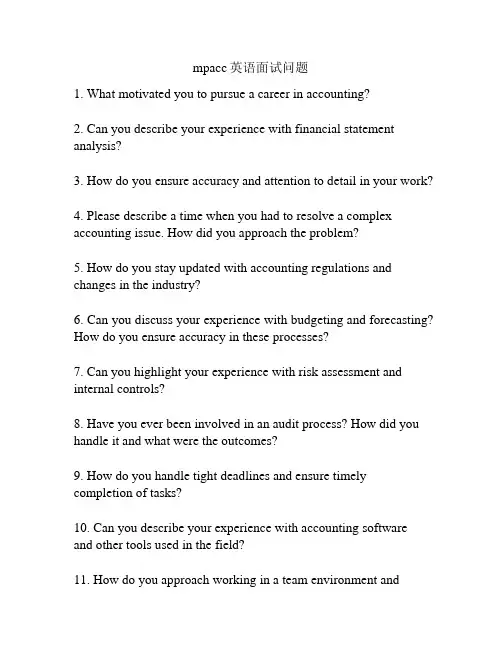
mpacc英语面试问题1. What motivated you to pursue a career in accounting?2. Can you describe your experience with financial statement analysis?3. How do you ensure accuracy and attention to detail in your work?4. Please describe a time when you had to resolve a complex accounting issue. How did you approach the problem?5. How do you stay updated with accounting regulations and changes in the industry?6. Can you discuss your experience with budgeting and forecasting? How do you ensure accuracy in these processes?7. Can you highlight your experience with risk assessment and internal controls?8. Have you ever been involved in an audit process? How did you handle it and what were the outcomes?9. How do you handle tight deadlines and ensure timely completion of tasks?10. Can you describe your experience with accounting software and other tools used in the field?11. How do you approach working in a team environment andcollaborating with other departments?12. Can you provide an example of when you had to communicate complex financial information to non-financial stakeholders?13. How do you handle pressure and prioritize tasks when multiple deadlines are approaching?14. Can you share a situation where you had to exercise professional ethics in your work?15. Do you have any experience with international accounting standards? If so, can you discuss your knowledge in this area?16. Are you familiar with tax laws and regulations? How do you stay updated with changes in tax codes?17. Do you have experience with cost accounting? Can you discussa project or situation where you implemented cost-saving measures?18. Can you discuss your experience with analyzing financial data and making recommendations based on your findings?19. How do you ensure confidentiality and data security when handling sensitive financial information?20. Can you discuss your long-term goals and how the role of an accountant fits into your career path?。
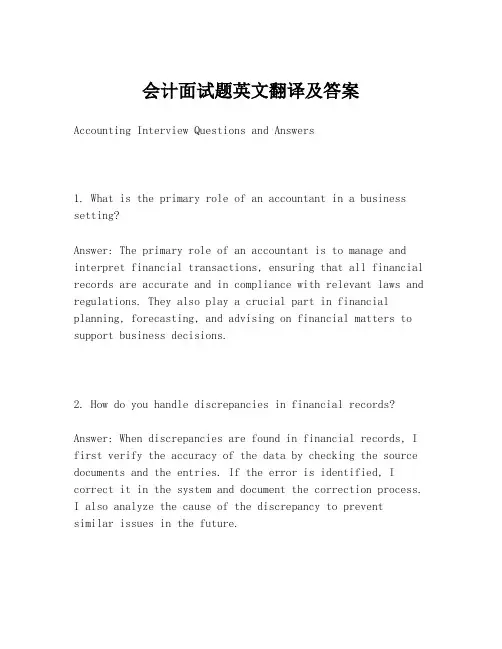
会计面试题英文翻译及答案Accounting Interview Questions and Answers1. What is the primary role of an accountant in a business setting?Answer: The primary role of an accountant is to manage and interpret financial transactions, ensuring that all financial records are accurate and in compliance with relevant laws and regulations. They also play a crucial part in financial planning, forecasting, and advising on financial matters to support business decisions.2. How do you handle discrepancies in financial records?Answer: When discrepancies are found in financial records, I first verify the accuracy of the data by checking the source documents and the entries. If the error is identified, I correct it in the system and document the correction process.I also analyze the cause of the discrepancy to preventsimilar issues in the future.3. What are the key financial statements, and what do they represent?Answer: The key financial statements include the Balance Sheet, Income Statement, Cash Flow Statement, and Statementof Changes in Equity. The Balance Sheet represents the company's financial position at a specific point in time, showing assets, liabilities, and equity. The Income Statement, also known as the Profit and Loss Statement, shows the company's revenues and expenses over a period, resulting inthe net profit or loss. The Cash Flow Statement illustratesthe inflows and outflows of cash, while the Statement of Changes in Equity details the changes in the equity accounts during the period.4. How do you ensure compliance with GAAP (Generally Accepted Accounting Principles)?Answer: To ensure compliance with GAAP, I stay updated withthe latest accounting standards and regulations. I applythese principles consistently in preparing financial statements and maintain proper documentation for all transactions. Additionally, I collaborate with auditors and other financial professionals to review and validate the accuracy and compliance of financial reporting.5. Can you explain the difference between accrual and cashbasis accounting?Answer: Accrual basis accounting records revenues and expenses when they are earned or incurred, regardless of when cash is received or paid. This method provides a more comprehensive picture of a company's financial performance over a period. On the other hand, cash basis accounting records transactions only when cash is exchanged, which can result in a less accurate reflection of the business's financial health, especially for businesses with significant credit sales or purchases.6. What is your experience with budgeting and financial forecasting?Answer: I have extensive experience in creating and managing budgets, as well as conducting financial forecasting. I use historical data, market trends, and business plans to project future financial performance. This process helps in strategic planning and decision-making, ensuring that the company is on track to meet its financial goals.7. How do you approach the task of auditing a company's financial records?Answer: When auditing a company's financial records, I start by understanding the company's operations and financialsystems. I then review the financial statements and underlying transactions to ensure they are accurate and comply with GAAP. I also look for any signs of fraud or errors and recommend corrective actions if necessary.8. What software and tools are you familiar with for accounting purposes?Answer: I am proficient in various accounting software and tools such as QuickBooks, Xero, SAP, and Microsoft Excel. These tools help in streamlining the accounting process, from recording transactions to generating financial reports.9. Can you describe a challenging situation you faced in your accounting career and how you resolved it?Answer: One challenging situation I encountered was identifying and correcting a complex error in a large set of financial records. I resolved it by working closely with the team, meticulously reviewing the data, and implementing a systematic approach to trace and correct the error. This experience reinforced the importance of attention to detail and effective communication in resolving accounting issues.10. How do you stay current with the latest accounting trendsand regulations?Answer: I stay current by participating in professional development courses, attending industry conferences, and being an active member of accounting associations. I also regularly read industry publications and follow updates from regulatory bodies to ensure my knowledge and practices are up to date.Conclusion:In conclusion, accounting is a dynamic field that requires continuous learning and adaptation to new regulations and technologies. As an accounting professional, I am committed to maintaining the highest standards of accuracy, compliance, and ethical practice to support the financial health of the organizations I work with.。
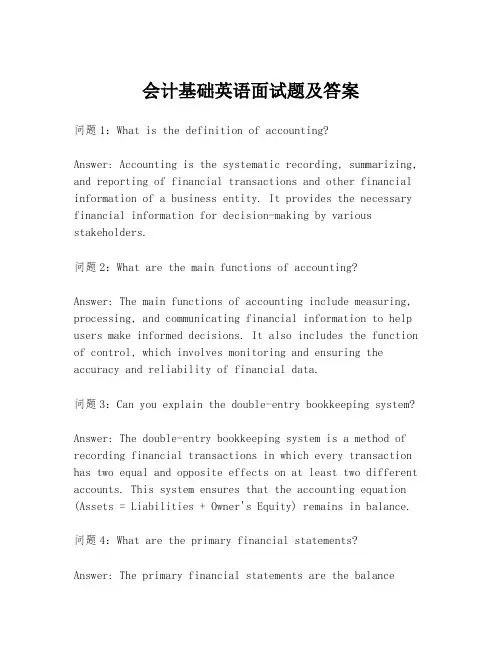
会计基础英语面试题及答案问题1:What is the definition of accounting?Answer: Accounting is the systematic recording, summarizing, and reporting of financial transactions and other financial information of a business entity. It provides the necessary financial information for decision-making by various stakeholders.问题2:What are the main functions of accounting?Answer: The main functions of accounting include measuring, processing, and communicating financial information to help users make informed decisions. It also includes the function of control, which involves monitoring and ensuring the accuracy and reliability of financial data.问题3:Can you explain the double-entry bookkeeping system?Answer: The double-entry bookkeeping system is a method of recording financial transactions in which every transaction has two equal and opposite effects on at least two different accounts. This system ensures that the accounting equation (Assets = Liabilities + Owner's Equity) remains in balance.问题4:What are the primary financial statements?Answer: The primary financial statements are the balancesheet, income statement, and statement of cash flows. The balance sheet provides a snapshot of a company's financial position at a specific point in time, the income statement shows the company's profitability over a period, and the statement of cash flows reports the inflows and outflows of cash during the period.问题5:What is the purpose of an income statement?Answer: The purpose of an income statement is to summarize a company's revenues, expenses, and profits over a specific period. It helps stakeholders understand the company's financial performance and profitability.问题6:How does depreciation affect a company's financial statements?Answer: Depreciation is the systematic allocation of the cost of a tangible asset over its useful life. It affects a company's financial statements by reducing the asset's carrying value on the balance sheet and by increasing the expenses on the income statement, which in turn reduces the net income.问题7:What is the difference between cash accounting and accrual accounting?Answer: Cash accounting records transactions when cash is received or paid, while accrual accounting records transactions when they occur, regardless of when the cash is received or paid. Accrual accounting provides a morecomprehensive picture of a company's financial performance and position over time.问题8:What is the role of a Certified Public Accountant (CPA)?Answer: A Certified Public Accountant (CPA) is a licensed professional who provides accounting, auditing, and other financial services. They are responsible for ensuring the accuracy and compliance of financial records, providing advice on tax planning, and helping businesses meet regulatory requirements.问题9:How do you calculate the current ratio in accounting?Answer: The current ratio is calculated by dividing a company's current assets by its current liabilities. It is a measure of a company's ability to pay its short-term obligations with its short-term assets.问题10:What is the purpose of a budget in a business?Answer: The purpose of a budget in a business is to plan and control the allocation of resources. It helps in setting financial goals, monitoring performance, and making strategic decisions.结束语:The above questions and answers provide a basic understanding of accounting principles and practices. It is important for anyone in the field of accounting to have a solid grasp ofthese concepts to effectively perform their duties and contribute to the financial health of an organization.。
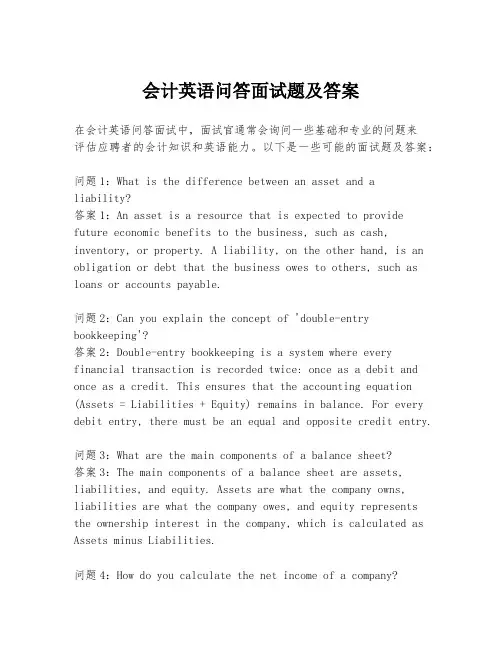
会计英语问答面试题及答案在会计英语问答面试中,面试官通常会询问一些基础和专业的问题来评估应聘者的会计知识和英语能力。
以下是一些可能的面试题及答案:问题1:What is the difference between an asset and aliability?答案1:An asset is a resource that is expected to provide future economic benefits to the business, such as cash, inventory, or property. A liability, on the other hand, is an obligation or debt that the business owes to others, such as loans or accounts payable.问题2:Can you explain the concept of 'double-entry bookkeeping'?答案2:Double-entry bookkeeping is a system where every financial transaction is recorded twice: once as a debit and once as a credit. This ensures that the accounting equation (Assets = Liabilities + Equity) remains in balance. For every debit entry, there must be an equal and opposite credit entry.问题3:What are the main components of a balance sheet?答案3:The main components of a balance sheet are assets, liabilities, and equity. Assets are what the company owns, liabilities are what the company owes, and equity represents the ownership interest in the company, which is calculated as Assets minus Liabilities.问题4:How do you calculate the net income of a company?答案4:Net income is calculated by subtracting all expenses from the total revenue of the company. It is the profit that remains after all the costs of running the business have been covered. The formula is: Net Income = Total Revenue - Total Expenses.问题5:What is the purpose of a trial balance?答案5:A trial balance is a report that lists the balances of all general ledger accounts at a particular point in time.Its purpose is to ensure that the debits and credits have been recorded correctly and that the accounting equation isin balance.问题6:How would you define 'depreciation' in accounting?答案6:Depreciation is the systematic allocation of the cost of a tangible asset over its useful life. It is used toreflect the consumption of the asset's economic benefits over time and to match the expense with the revenue generated by the asset.问题7:What is the role of an auditor in a company?答案7:An auditor's role is to provide an independent assessment of a company's financial statements to ensure they are accurate, complete, and comply with generally accepted accounting principles (GAAP) or international financial reporting standards (IFRS). They also check for fraud and errors.结束语:In conclusion, accounting is a critical function in any business, and understanding the language of accounting isessential for professionals in this field. These interview questions and answers provide a glimpse into the types of knowledge and skills that are often sought after by employers in the accounting industry. It is important for candidates to be well-prepared and to demonstrate both their technical expertise and their ability to communicate effectively in English.。
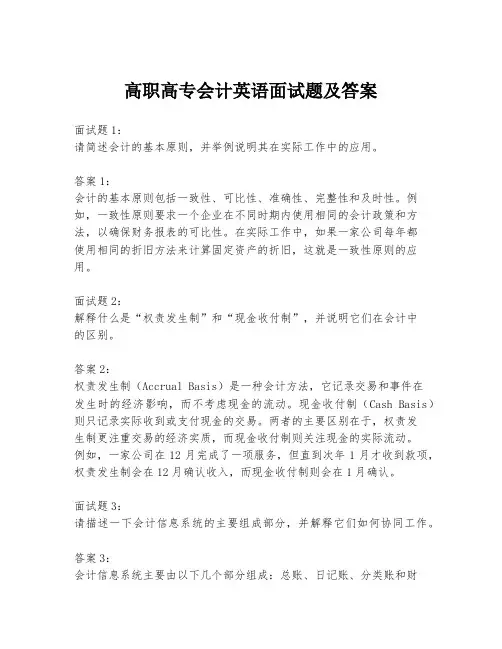
高职高专会计英语面试题及答案面试题1:请简述会计的基本原则,并举例说明其在实际工作中的应用。
答案1:会计的基本原则包括一致性、可比性、准确性、完整性和及时性。
例如,一致性原则要求一个企业在不同时期内使用相同的会计政策和方法,以确保财务报表的可比性。
在实际工作中,如果一家公司每年都使用相同的折旧方法来计算固定资产的折旧,这就是一致性原则的应用。
面试题2:解释什么是“权责发生制”和“现金收付制”,并说明它们在会计中的区别。
答案2:权责发生制(Accrual Basis)是一种会计方法,它记录交易和事件在发生时的经济影响,而不考虑现金的流动。
现金收付制(Cash Basis)则只记录实际收到或支付现金的交易。
两者的主要区别在于,权责发生制更注重交易的经济实质,而现金收付制则关注现金的实际流动。
例如,一家公司在12月完成了一项服务,但直到次年1月才收到款项,权责发生制会在12月确认收入,而现金收付制则会在1月确认。
面试题3:请描述一下会计信息系统的主要组成部分,并解释它们如何协同工作。
答案3:会计信息系统主要由以下几个部分组成:总账、日记账、分类账和财务报表。
总账记录所有交易的最终结果;日记账记录每笔交易的详细信息;分类账按账户分类记录交易;财务报表则提供企业的财务状况和经营成果的总结。
这些组成部分通过会计循环相互连接,确保信息的准确性和完整性。
面试题4:什么是财务报表分析?请列举几种常用的财务比率分析方法。
答案4:财务报表分析是一种评估企业财务状况和经营成果的方法,它通过分析财务报表中的数据来评估企业的盈利能力、流动性、偿债能力和运营效率。
常用的财务比率分析方法包括流动比率、速动比率、资产负债率、净资产收益率(ROE)和总资产收益率(ROA)等。
面试题5:请解释什么是“会计估计”,并举例说明其在实际会计工作中的重要性。
答案5:会计估计是指在缺乏精确信息的情况下,对财务报表中某些项目进行的估计。
例如,企业需要估计坏账准备、存货的净实现价值等。
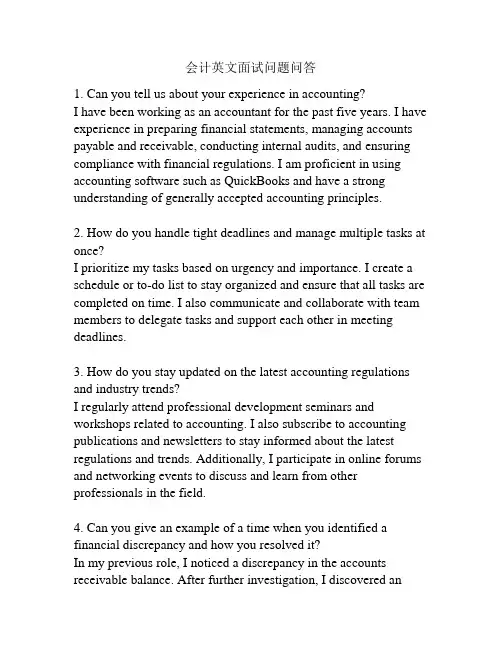
会计英文面试问题问答1. Can you tell us about your experience in accounting?I have been working as an accountant for the past five years. I have experience in preparing financial statements, managing accounts payable and receivable, conducting internal audits, and ensuring compliance with financial regulations. I am proficient in using accounting software such as QuickBooks and have a strong understanding of generally accepted accounting principles.2. How do you handle tight deadlines and manage multiple tasks at once?I prioritize my tasks based on urgency and importance. I create a schedule or to-do list to stay organized and ensure that all tasks are completed on time. I also communicate and collaborate with team members to delegate tasks and support each other in meeting deadlines.3. How do you stay updated on the latest accounting regulations and industry trends?I regularly attend professional development seminars and workshops related to accounting. I also subscribe to accounting publications and newsletters to stay informed about the latest regulations and trends. Additionally, I participate in online forums and networking events to discuss and learn from other professionals in the field.4. Can you give an example of a time when you identified a financial discrepancy and how you resolved it?In my previous role, I noticed a discrepancy in the accounts receivable balance. After further investigation, I discovered anerror in recording a sales transaction, resulting in an overstated balance. To resolve the issue, I traced the error back to its source, corrected the entry, and adjusted the accounts receivable balance accordingly. I also implemented additional checks and controls to prevent similar errors in the future.5. How do you communicate financial information to non-financial stakeholders?I believe in presenting financial information in a clear and understandable manner. I avoid using complex jargon and explain concepts in layman's terms. Visual aids such as charts and graphs can also be helpful in presenting data. I encourage questions and discussions to ensure that non-financial stakeholders have a thorough understanding of the financial information presented.6. How do you handle confidential financial information?I understand the importance of maintaining confidentiality in accounting. I follow strict protocols to ensure that sensitive financial information is securely stored and accessed only by authorized personnel. I am familiar with data protection laws and regulations and strictly adhere to them to safeguard financial information.7. What is your approach to improving efficiency in accounting processes?I believe in adopting automation and technology to streamline accounting processes. This includes implementing accounting software, developing standardized templates and procedures, and utilizing electronic filing systems. I also regularly review and analyze existing processes to identify areas for improvement andmake necessary changes to increase efficiency.8. How do you handle difficult conversations with clients or colleagues?I approach difficult conversations with empathy and respect. I tryto understand the other person's perspective and actively listen to their concerns. I remain calm and composed, focusing on finding a solution rather than placing blame. I strive to maintain open and honest communication, and I am always willing to compromise and find common ground.9. How do you ensure accuracy and attention to detail in your work?I pay close attention to detail in all aspects of my work. I double-check my calculations and review my work before submitting it. I am also proactive in seeking feedback from colleagues or supervisors to ensure accuracy. Additionally, I am continuously improving my skills and knowledge through ongoing education and professional development to further enhance my accuracy and attention to detail.10. Why did you choose a career in accounting?I have always had a passion for numbers and problem-solving. Accounting provides me with the opportunity to work with numbers and financial data in a structured and analytical manner. It also offers a stable and rewarding career path with opportunitiesfor growth and advancement. I enjoy the challenge of ensuring financial accuracy and compliance, and I find satisfaction in helping businesses make informed financial decisions.。
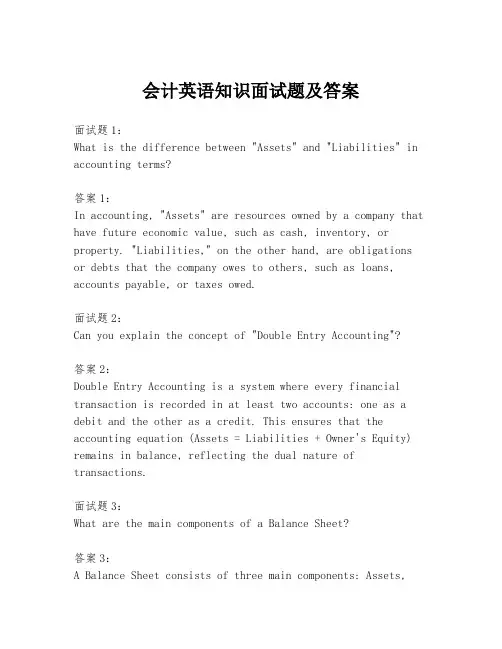
会计英语知识面试题及答案面试题1:What is the difference between "Assets" and "Liabilities" in accounting terms?答案1:In accounting, "Assets" are resources owned by a company that have future economic value, such as cash, inventory, or property. "Liabilities," on the other hand, are obligations or debts that the company owes to others, such as loans, accounts payable, or taxes owed.面试题2:Can you explain the concept of "Double Entry Accounting"?答案2:Double Entry Accounting is a system where every financial transaction is recorded in at least two accounts: one as a debit and the other as a credit. This ensures that the accounting equation (Assets = Liabilities + Owner's Equity) remains in balance, reflecting the dual nature of transactions.面试题3:What are the main components of a Balance Sheet?答案3:A Balance Sheet consists of three main components: Assets,Liabilities, and Owner's Equity. Assets are what the company owns, liabilities are what the company owes, and owner's equity represents the residual interest in the assets of the entity after deducting liabilities.面试题4:How does the "Accrual Basis" of accounting differ from the "Cash Basis"?答案4:The Accrual Basis of accounting records revenues and expenses when they are earned or incurred, regardless of when cash is received or paid. The Cash Basis, however, records transactions only when cash is exchanged, which means revenues and expenses are recognized when cash is received or paid out.面试题5:What is the purpose of "Financial Statement Analysis"?答案5:Financial Statement Analysis is used to assess a company's financial health and performance by examining its financial statements. It helps investors, creditors, and managers to make informed decisions based on the company's profitability, liquidity, solvency, and operational efficiency.面试题6:Explain the term "Depreciation" in accounting.答案6:Depreciation is the systematic allocation of the cost of a tangible asset over its useful life. It is used to accountfor the wear and tear or obsolescence of assets over time, reflecting the decline in the asset's value and usefulness.面试题7:What is the role of "Auditing" in the financial reporting process?答案7:Auditing is the process of independently verifying and validating the accuracy and completeness of a company's financial statements. It provides assurance to stakeholders that the financial statements are free from material misstatements and are presented fairly in accordance with the applicable financial reporting framework.结束语:Understanding these fundamental accounting concepts iscrucial for anyone pursuing a career in finance or accounting. They form the basis for interpreting and analyzing financial information, which is essential for making sound business decisions.。
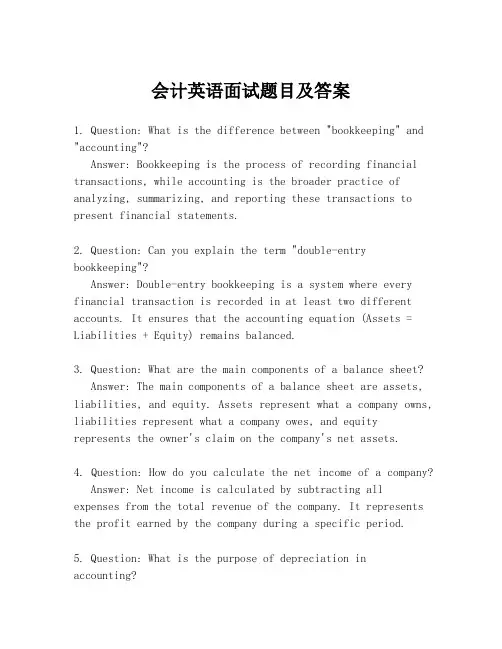
会计英语面试题目及答案1. Question: What is the difference between "bookkeeping" and "accounting"?Answer: Bookkeeping is the process of recording financial transactions, while accounting is the broader practice of analyzing, summarizing, and reporting these transactions to present financial statements.2. Question: Can you explain the term "double-entry bookkeeping"?Answer: Double-entry bookkeeping is a system where every financial transaction is recorded in at least two different accounts. It ensures that the accounting equation (Assets = Liabilities + Equity) remains balanced.3. Question: What are the main components of a balance sheet? Answer: The main components of a balance sheet are assets, liabilities, and equity. Assets represent what a company owns, liabilities represent what a company owes, and equity represents the owner's claim on the company's net assets.4. Question: How do you calculate the net income of a company? Answer: Net income is calculated by subtracting all expenses from the total revenue of the company. It represents the profit earned by the company during a specific period.5. Question: What is the purpose of depreciation in accounting?Answer: Depreciation is the systematic allocation of the cost of a tangible asset over its useful life. It is used to match the expense of using the asset with the revenue it generates over time.6. Question: Explain the term "cash flow".Answer: Cash flow refers to the inflow and outflow of cash in a business. Positive cash flow indicates that a business is generating more cash than it is spending, while negative cash flow indicates the opposite.7. Question: What is the role of an auditor in a company?Answer: An auditor's role is to provide an independent assessment of a company's financial statements to ensure they are accurate, complete, and comply with accounting standards and regulations.8. Question: How would you handle a situation where there isa discrepancy in the financial records?Answer: In such a situation, I would first identify the nature and extent of the discrepancy. Then, I would investigate the possible causes, correct the error, and update the records accordingly. If necessary, I would also consult with senior management or the audit team.9. Question: What is the importance of ethical behavior in accounting?Answer: Ethical behavior in accounting is crucial for maintaining trust and integrity in financial reporting. It ensures that financial information is accurate, reliable, and unbiased, which is essential for stakeholders to makeinformed decisions.10. Question: Can you describe the process of budgeting?Answer: Budgeting is the process of estimating and planning for a company's future financial needs. It involves setting financial goals, allocating resources, and monitoring actual performance against the budget to manage and control expenses.。
会计英文面试问题会计核算职能是指主要运用货币计量形式,通过确认、计量、记录和报告,从数量上连续、系统和完整的反映各个单位的经济活动情况,为加强经济管理和提高经济效益提供会计信息。
下面就由店铺为大家介绍一下会计英文面试问题的文章,欢迎阅读。
会计英文面试问题篇1"work experience" is the type of work you‘ve done in the past. If you haven‘t started working yet you can say "Right now I‘m still a student." or "I‘m a recent grad and Ihaven‘t started working yet." In the second sentence, "recent grad" is short for "recent graduate" and means that you have just finished school.请告诉我你过去的工作经验,工作经验就是你过去所做的工作。
如果尚未开始工作,就可以回答“Right now I‘m still a student.”(现在我还是个学生。
)或者说“I‘m a recent grad and I haven‘t started working yet.”(我刚刚毕业,还没有开始工作。
)“recent grad”是“recent graduate”的缩写,意思是刚刚毕业。
What‘s your greatest weakness?This is a popular question that western employers like to ask to make candidates nervous! In fact, they ask this to know how you respond to a difficult question. You shouldn‘t answer by telling your greatest weakness since you might not get the job! Instead, you can tell t hem something that isn‘t directly related to the job position.你最大的缺点是什么?西方老板特别爱问这个问题,让面试者感到很紧张。
会计英语问答面试题目及答案问题1:What is the basic accounting equation?答案1:The basic accounting equation is Assets = Liabilities + Owner's Equity. It represents the fundamental relationship between a company's assets, liabilities, and equity, showing that the total assets of a company are financed by theliabilities it owes to creditors and the equity it holds forits owners.问题2:What are the main functions of financial accounting?答案2:The main functions of financial accounting include recording, classifying, summarizing, and reporting financial transactions. These functions help in providing financial information to various stakeholders such as investors, creditors, and government agencies.问题3:What is the difference between a journal and a ledger? 答案3:A journal is a book of original entry where all financial transactions are recorded in chronological order. A ledger, on the other hand, is a book that contains the final summary of all accounts, grouped by type, such as assets, liabilities, equity, revenue, and expenses.问题4:What is the purpose of adjusting entries in accounting? 答案4:Adjusting entries in accounting are made to ensurethat the financial statements reflect the actual financial position of the company as of the end of the accounting period. They correct and update the accounts for anyincomplete or unrecorded transactions.问题5:Can you explain the concept of depreciation?答案5:Depreciation is the systematic allocation of the cost of a tangible asset over its useful life. It is a non-cash expense that reflects the wear and tear or consumption of the asset's value over time.问题6:What is the accrual basis of accounting?答案6:The accrual basis of accounting records revenues and expenses when they are earned or incurred, not when cash is received or paid. This method provides a more accuratepicture of a company's financial performance over a specific period.问题7:How do you calculate the current ratio?答案7:The current ratio is calculated by dividing the total current assets by the total current liabilities. It is a liquidity ratio that measures a company's ability to pay its short-term obligations with its short-term assets.问题8:What is the role of an auditor in the financial reporting process?答案8:An auditor's role in the financial reporting processis to independently verify the accuracy and completeness of a company's financial statements. They provide assurance to stakeholders that the financial statements are free from material misstatements.问题9:What are the ethical considerations for an accountant? 答案9:Ethical considerations for an accountant includemaintaining integrity, objectivity, confidentiality, and professional competence. Accountants must also adhere to the relevant professional standards and regulations.问题10:How does the concept of conservatism apply in accounting?答案10:The concept of conservatism in accounting suggests that accountants should exercise caution when making estimates and judgments. It encourages the understatement of assets and the overstatement of liabilities, which can result in a more prudent representation of a company's financial position.结束语:These questions and answers provide a foundation for understanding the key concepts and practices in the field of accounting. Mastery of these topics is essential for anyone pursuing a career in accounting or finance.。
xx会计英语面试常见问题1. What’s the meaning of your English name? 你的英文名字有什么含义么?答复示范: The name King may sound a bit aggressive, I hope it won’t make you feel unfortable. As a matter of fact, I chose the name King simply because it sounds likemy Chinese name Jing. But, there is also a hidden meaningin it, that is, I wish to conquer diseases like a King!2. What’s the meaning of your email address? 你的电子邮件地址有什么寓意么?答复示范: Neverlazy? Oh, I want to encourage myself never to be lazy! You know I am a hardworking person. So, it’s my slogan!3. Where are you from? Where is your hometown? 你是哪里人?家乡在什么地方?答复示范: Well, my hometown is a small town which you probably have never heard of. The name of the town is Dehui, which means “good moral” in Chinese. The town is locatedin the middle of China’s Northeast. When you look at the map, it looks like the eye of the rooster. You know, China looks like a rooster on the map, and the Northeast region looks just like the head of the rooster. My hometown “Good Moral Town” is unknown to most people because it’s quite poor. The average ine for a family is less than one thousand RMB per month.4. Why did you select your major area of study? 你为什么选择了这个专业?答复示范: I selected Business English as I was quite good at English back in high school. Apart from this, my high school teachers remended that I select a major related to business, since I showed some good qualities for business management at a young age. So, I chose this major, business plus English, two in one, hehe.5. What subjects were your favorite? Why? 你最喜欢的课程是什么,为什么?答复示范: I like the subjects that include lots of experiments, for example, CAD and Circuit Design. I found that I can learn more quickly by doing experiments than only studying the theories. I guess it’s partly because I am good with my hands, and doing experiments gives me a chance to learn in a creative way.6. What subjects were your least favorite? Why? 你最不喜欢的课程是什么?为什么?答复示范: I found Macroeconomics and Microeconomics disappointing as well, for the reason that their information fell behind the times. For example, the exchange rate between RMB and USD stilled remained 8.3 : 1 in the text! You can imagine how disappointed we were. So I spent more time listening to the lectures on economics organized by the Student Union.7. Other than the courses you studied, what is the most important thing you learned from your college experience?除了学习方面,你在大学里面最大的收获是什么?答复示范: My biggest achievement in my college life, I think, is that I have learnt to make choices. You know, there are various activities and part time jobs on campus, each sounds attractive. I’ve carefully chosen some of them which can help to achieve my long term career goal. I have said “no” to lots of invitations, like the dancing contests each year. I only participated in one of them and decided that rehearsals oupy too much time. In my opinion, nothing is more important than making the right choice.8. How did you finance your college education? 你大学的费用是怎么样支付的?(家里供还是自己打工?)答复示范: So far, my tuition and living expense are around 40,000 RMB. My parents offer two thirds of it and I pay the rest of it. I have been granted scholarship three times, making 5,000 RMB in total. Teaching and other part-time jobs made another 5,000.9. Would you briefly describe this pany to me? 介绍一下你的原单位,好吗?答复示范:“广盛发”,the name means “a big, prosperous pany”, hehe, although it’s not really a verybig pany. But, it’s true that the pany is quite prosperous. It specializes in exporting women’s shoes. Wit h only 10employees so far the turnover last year was up to15,000,000 RMB. I am one of the three customer service officers, with the responsibility of order taking, tracking and general customer service roles. Due to the limited number of staff, we all work more than 10 hours a day, 7 days a week in busy season.10. Would you describe your typical working day? 请你描述一下自己典型的一天的工作吧。
英语会计面试题目及答案问题1:What is the difference between a debit and a credit in accounting?答案1: In accounting, debits and credits are used to record financial transactions. A debit increases the value of anasset account or an expense account, and decreases the valueof a liability, equity, or revenue account. Conversely, acredit increases the value of a liability, equity, or revenue account, and decreases the value of an asset or an expense account. They are part of the double-entry bookkeeping system, ensuring that the accounting equation remains in balance.问题2:Can you explain the concept of accrual accounting?答案2: Accrual accounting is a method of accounting where revenues and expenses are recorded when they are earned or incurred, not when cash is received or paid. This approach provides a more accurate picture of a company's financial performance over a specific period, as it matches revenueswith the expenses incurred to generate those revenues.问题3:What are the main components of a balance sheet?答案3: A balance sheet is a financial statement thatpresents a company's financial position at a specific pointin time. The main components include assets (what the company owns), liabilities (what the company owes), and equity (thenet worth of the company, which is the difference between assets and liabilities).问题4:How do you calculate the gross profit margin?答案4: The gross profit margin is calculated by dividing the gross profit by the net sales. Gross profit is the difference between the net sales and the cost of goods sold (COGS). The formula is: Gross Profit Margin = (Net Sales - COGS) / Net Sales.问题5:What is the purpose of a cash flow statement?答案5: A cash flow statement is a financial statement that provides information about a company's cash inflows and outflows during a specific period. It helps investors and creditors assess the liquidity of the company and its ability to generate cash to fund operations, pay debts, and invest in future growth.问题6:How do you handle errors in financial records?答案6: Errors in financial records should be corrected promptly to maintain accurate financial statements. The process involves identifying the error, determining the correct amount, and adjusting the accounts accordingly. This may involve journal entries to reverse the incorrect entry and record the correct one, ensuring the integrity of the financial data.问题7:What are the ethical considerations for an accountant?答案7: Ethical considerations for an accountant include maintaining integrity, confidentiality, and objectivity. Accountants must adhere to professional standards and regulations, avoid conflicts of interest, and ensure that their work is accurate and truthful.问题8:Can you describe a situation where you had to resolve a complex accounting issue?答案8: [应聘者应根据个人经验提供一个具体的例子,说明如何识别问题、分析情况、采取行动并成功解决问题的过程。
会计专业面试英语(2)会计专业面试英语1. You may be overqualified for the position we have to offer. Strong panies need strong people. A growing, energetic pany is rarely unable to use its employees talents. Emphasize your interest in a long-term association, pointing out that the employer will get a faster return on investment because you have more experience than required.2. What is your management style? (If youve never thought about this, its high time you did.) "Open-door management" is best ... And you get the job done on time or inform your management.3. Are you a good manager? Give an example. Why do you feel you have top managerial potential? Keep your answer achievement- and task-oriented; emphasize management skills -- planning, organizing, interpersonal, etc.4. What do you look for when you hire people?Skills, initiative, adaptability.5. Did you ever fire anyone? If so, what were the reasons and how did you handle it? Give a brief example of a time when you faced this, and stress that it workedout well.6. What do you see as the most difficult task in beinga manager? Getting things planned and done on timewithin the budget.7. What do your subordinates think of you? Be honest and positive...they can check your responses easily.8. What is your biggest weakness as a manager? Be honest and end on a positive note, e.g. "I dont enjoy reprimanding people, so I try to begin with something positive first."1. Why are you leaving your present job? Refine your answer based on your fort level and honesty. Give a "group" answer if possible, e.g. our department was consolidated or eliminated.2. How do you feel about leaving all of your benefits? Concerned but not panicked.3. Describe what you feel to be an ideal working environment. One in which people are treated as fairly as possible.4. How would you evaluate your present firm? Its an excellent pany that afforded me many fine experiences1. How have you helped increase sales? Profits? Explain in some detail, citing figures and specific examples.2. Have you helped reduce costs? How? Describe in some detail with specifics.3. How much money did you aount for? Give examples as to your responsibilities. Explain how the budget wasdetermined, and your role in overseeing your departments portion.4. How many people did you supervise on your last job? Explain the structure of your department and your role as manager.5. Do you like working with figures more than words? Be honest but positive.6. In your current or last position, what features did you like the most? Least? Be honest but put a positive spin on your least favorite duties.7. In your current or last position, what are or were your five most significant aomplishments?1. Why havent you found a new position before now? Finding a job is easy; finding the right job is more difficult. Stress that you are being selective, and are looking for the right "fit."2.Had you thought of leaving your present position before? If so, what do you think held you there?Explain that your job is no longer challenging and that you feel your talents are best used elsewhere.3. What do you think of your boss? Be as positive as you can, even if you dont really believe it.4.Would you describe a situation in which your work was criticized? Be as positive as you can and emphasize what you learned from the situation.5. What other types of jobs or panies are you considering? Keep your answer related to this panys field, and dont give out specific pany names.。
会计英语面试资料性格问题1. do you generally speak to people before they speak to you? it depends on the circumstances. -一般来说,在人们和你之前你会先和他们说话吗?看情况2.what was the last book you read? movie you saw? sporting event you attended? talk about books, sports or films to show that you have balance in your life. 你最近看的最后一本书,一部电影,参与的运动说一些书,运动和电影显示你可以平衡你的3. what is the toughest part of a job for you? be honest. remember, not everyone can do everything.4. are you creative? yes. give examples that relate to your current job.5. how would you describe your own personality? balanced is a good word to use, but remember the type of pany you are interviewing at. some panies may want someone who is aggressive and a go-getter. 你如何形容你的个性?根据你所应聘的公司和职位的要求来调整你的答复,6. are you a leader? absolutely! cite specific examples using your current job as a reference point. 你是一个领导者吗当然是了。